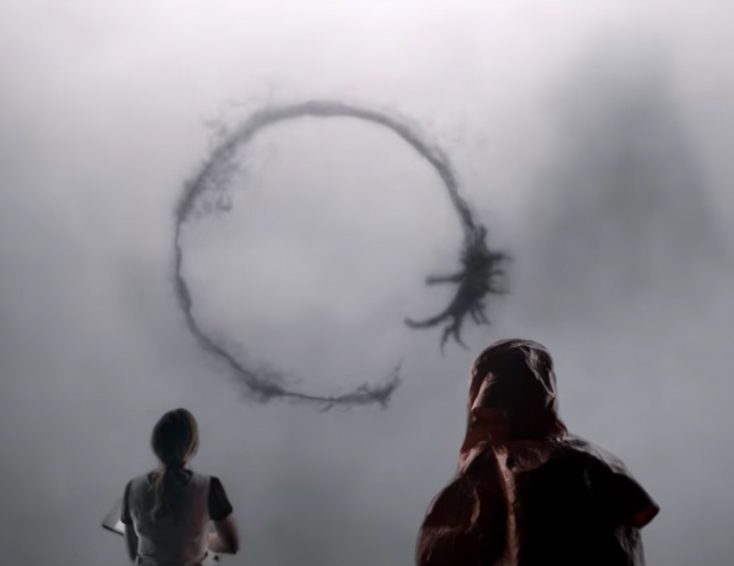By CLARENCE ZAMORA
Arrival made headlines during the announcement of nominees for the 89th Academy Awards, not for its whopping eight nods (including Best Picture, Best Director, and Best Adapted Screenplay), but for the lack of a crucial one: Best Actress for Amy Adams. Some are already calling it one of the most glaring Oscar snubs in recent memory.
Adams plays Dr. Louise Banks, a linguist, polyglot, and scientist (or social scientist, if you want to address that particular contention). Louise is not your typical sci-fi heroine, or even a typical sci-fi scientist at that. She’s not armed with an arsenal of mathematical equations that can solve the mysteries of the universe, or superb engineering skills. She doesn’t have an Iron Man suit or sleek astronaut gear, rather, she is seen in the trailers and promotional posters donning a gaudy orange hazmat suit. All that stands between her and a potential threat to mankind is a whiteboard, remarkable patience, and intuition for language and communication.
“We are so bound by time,” Louise observes in the beginning of the film, where we get significant glimpses into the short life of her daughter, and we run away with the notion that these sequences are a prologue of sorts. That Louise is defined, throughout the movie, by her grief.
Then the Heptapods — seven-tentacled aliens in elliptical spacecrafts resembling giant, smooth stones — arrive in 12 random locations across the globe. Chaos ensues, but for a first-encounter film, Arrival is relatively quiet; the urgency is palpable, but never forced. Tensions are communicated by smartphones going off in a lecture hall, newscasts on TV and computer screens showing riots and general mass hysteria — scenes we’re all too familiar with when crisis erupts with ample media coverage, a statement of how connected and isolated we are at the same time.

Louise is recruited by a military officer named Colonel Weber (played by Forest Whitaker), who seems to think she can simply Google Translate the Heptapods’ indecipherable oral language in a snap so they can move on to pressing concerns, like kindly asking whether they intend to annihilate the human race, or just borrow a cup of sugar. Weber forgets that translation isn’t a mathematical one-is-to-one rendering of a language into another. A translator has to pick apart the nuances in connotation, denotation, and cultural meanings, which means they have to be proficient in both the source language and the target language. And even then, things still get lost in translation. Linguistics, particularly the finer points of discourse analysis, has a charming way of making your brain feel like it just did triple sets of squats without your permission.
In one scene, Colonel Weber is impatient to know when they can communicate with the Heptapods, so Louise, like a typical social science researcher used to condescension from her peers in the hard sciences, takes a dry eraser and clears a whiteboard full of incomprehensible mathematical formulas and writes down what Colonel Weber wants to ask the aliens: “What is your purpose on Earth?” She firmly explains how it just cannot be done without introducing difficult concepts to beings who we share no common vocabulary with. You know those scenes where movie scientists go off on a super important scientific monologue? That right there was the social sciences equivalent.
Adams can portray silent resolve and exasperation in one look without overstating, whether it’s selling the maternal sequences with Louise’s daughter or cracking under the immense pressure of her task; not even the hazmat suits can hamper her performance. I’ve personally wanted to lovingly hurl an Oscar at Amy Adams ever since she played a fish-out-of-water Disney Princess in Enchanted, and again when she stood her ground against Meryl Streep, Viola Davis, and the late Philip Seymour Hoffman in Doubt. She’s been nominated as many times as Leonardo DiCaprio in the Academy Awards, so where are her memes, Internet? Where is the #GiveAmyAnOscar hashtag?

As translation features heavily in Arrival, the film itself is also a translation — adapted by Eric Heisserer for the big screen based on Ted Chiang’s 1998 short story, Story of Your Life. Of course, there are elements in the text that simply can’t be rendered visually. A spoiler warning should extend to Chiang’s original story. This is not a read-it-first-before-watching type of film. On the contrary, this is a film I would probably have received differently had I read Chiang’s arresting, speculative fiction prose first.
According to the Sapir-Whorf Hypothesis, our language processing — written, spoken, or signed — dictates our information processing which then dictates our spatial and temporal processing. In other words, language is how we define our reality, thus, learning a new language gives us a new lens in which to perceive.
So as Louise races against the clock to decipher the alien language, she starts picking it up herself and it eventually rewires her brain. It has no immediate effect on humanity, but it alters her life radically. And here, the audiences are attuned to this rewiring, almost the exact same moment Louise realizes it herself — a small switch that shifts the whole story into place.
You will not walk away fluent in an alien tongue after the credits roll, but understanding how Louise perceives reality as a result of her encounter with the Heptapods will hopefully haunt you with questions about the relativity of time, remembering, and how the language we speak and live in ultimately defines us.
Arrival opens in local cinemas starting February 15th.

0 comments on “Time and things that get lost in translation: An ‘Arrival’ review”